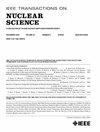Design and Performance of the FBCM23 ASIC for the CMS Luminosity Measurement
IF 1.9
3区 工程技术
Q3 ENGINEERING, ELECTRICAL & ELECTRONIC
引用次数: 0
Abstract
We present the design and evaluation of the FBCM23 ASIC designed for the Fast Beam Condition Monitoring (FBCM) system intended for the luminosity measurements in the upgraded CMS experiment at CERN. The ASIC is implemented in a CMOS 65 nm technology and consists of six front-end channels with a binary architecture optimized to work with用于CMS光度测量的FBCM23专用集成电路的设计与性能
本文介绍了用于欧洲核子研究中心(CERN)升级版CMS实验中光度测量的快束状态监测(FBCM)系统的FBCM23 ASIC的设计和评价。ASIC采用CMOS 65纳米技术实现,由六个前端通道组成,其二进制架构经过优化,可用于1.7 × 1.7 mm2的面积和290或150 μ m厚的硅传感器。提出的ASIC将取代现有的系统,以符合新的、具有挑战性的规范,涉及时间分辨率(1ns rms)和噪声,后者与位于半径接近14.5 cm的传感器的预期辐射损伤有关。预期总电离剂量(TID)和实验寿命结束时的通量分别为200 Mrad和2.5\乘以10^{15}~\text {n}/\text {cm}^{2}$, 1 MeV当量。我们介绍了ASIC的设计和完整的表征,包括TID辐照、单事件扰动(SEU)测试、热漂移和连接到传感器的ASIC的性能。
本文章由计算机程序翻译,如有差异,请以英文原文为准。
求助全文
约1分钟内获得全文
求助全文
来源期刊

IEEE Transactions on Nuclear Science
工程技术-工程:电子与电气
CiteScore
3.70
自引率
27.80%
发文量
314
审稿时长
6.2 months
期刊介绍:
The IEEE Transactions on Nuclear Science is a publication of the IEEE Nuclear and Plasma Sciences Society. It is viewed as the primary source of technical information in many of the areas it covers. As judged by JCR impact factor, TNS consistently ranks in the top five journals in the category of Nuclear Science & Technology. It has one of the higher immediacy indices, indicating that the information it publishes is viewed as timely, and has a relatively long citation half-life, indicating that the published information also is viewed as valuable for a number of years.
The IEEE Transactions on Nuclear Science is published bimonthly. Its scope includes all aspects of the theory and application of nuclear science and engineering. It focuses on instrumentation for the detection and measurement of ionizing radiation; particle accelerators and their controls; nuclear medicine and its application; effects of radiation on materials, components, and systems; reactor instrumentation and controls; and measurement of radiation in space.
 求助内容:
求助内容: 应助结果提醒方式:
应助结果提醒方式:


